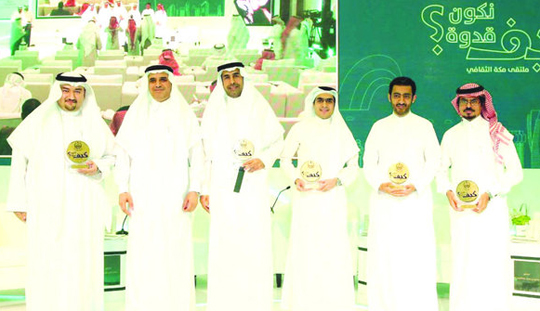Jeddah, May 17: The Makkah Cultural Forum concluded its cultural week, which during its last session showcased national role models that were successful and distinguished in different fields in the “Our Way to Role Model” symposium.

The cultural week highlighted national role models that have achieved, in some cases surmounting difficulties, to achieve local and global successes.
Present at the week were various segments of the society.
Mohammed Balghith, consultant, interventional cardiologist at the National Guard Heart Center who has achieved successes in this field, talked about his experience, which began in a small province in southern Saudi Arabia and grew to become a global success.
He said that everyone needs a role model to follow and to be influenced by, adding that “developing skills, setting goals, overcoming fear of failure, not stopping learning, working on skills development and how to communicate are all factors of success.”
Essam Amanullah Bukhari, former cultural attache at the Saudi Embassy in Japan, talked about the experiences of Saudis who were studying in Japan and successfully presented a bright image of Saudi Arabia through their achievements and creativity in various fields, including robotics, language, aviation industry and cars.
Director of Careem in Saudi Arabia, Hatem Al-Kahli, reviewed his experience in transforming the transportation company from a simple project to a successful one, making it a larger local project and finally a global project that has become a strategic partner of foreign countries’ governments in setting up and implementing plans.
Othman Mohammed Bakr, associate professor at King Abdullah University of Science and Technology (KAUST), talked about his unique and successful experience.
He said that “KAUST approved the proposal to establish a laboratory for nanotechnology” and from 2010 to 2013 he and some of his distinguished colleagues were able to establish this laboratory, “which has no parallel in the Middle East.”
Participants in the session on “culture and making of role model” agreed on how important it is for families to act to become role models for children and young people, as well as the importance of preventing them from inappropriate behavior through offering them constructive alternatives.






Comments
Add new comment